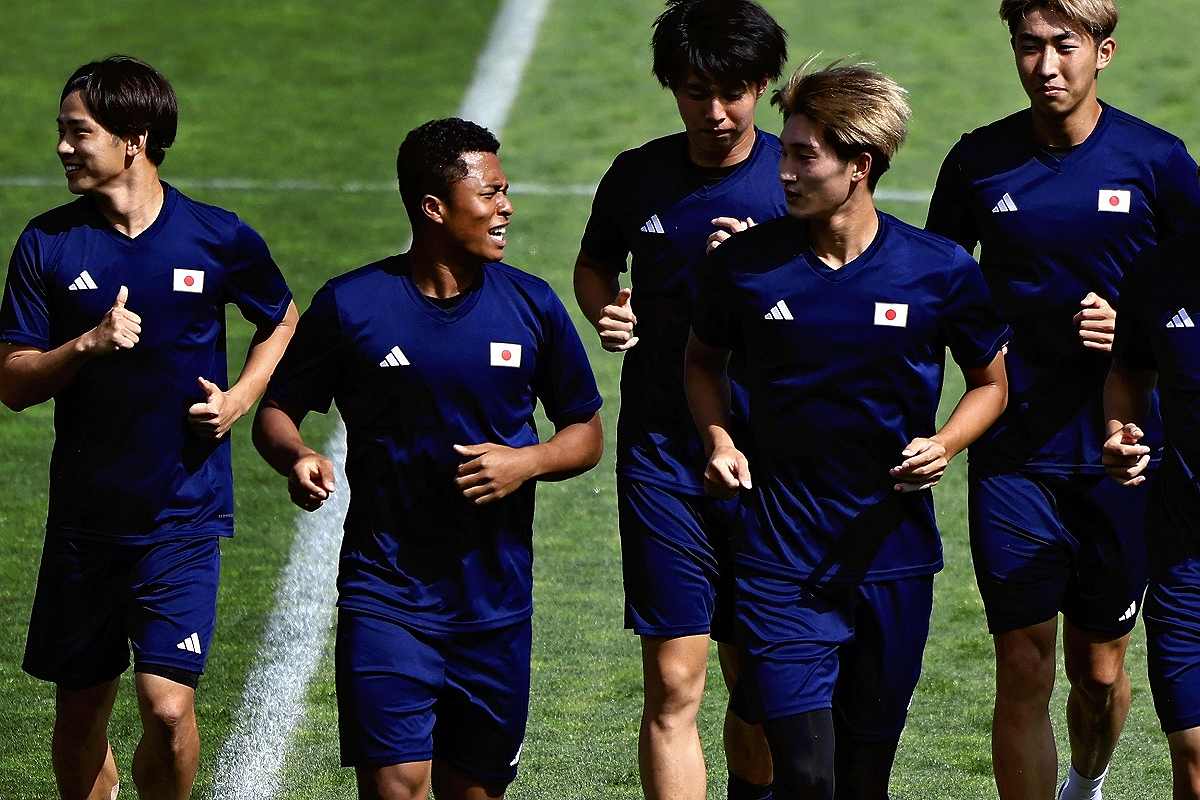Joel Fujita, Olympic Soccer Captain for Japan, Leads Team with Voice; Makes Up for Lack of Speed by Shaping Game

Joel Chima Fujita, second from left, works out with teammates before their match against Paraguay, in Bordeaux, France, on Tuesday.
20:00 JST, July 25, 2024
Joel Chima Fujita, captain of the Japan men’s soccer team at the Olympics, has used his high-pitched voice and experience as a leader since childhood to keep his team together.
“My strength is my voice. I create the rhythm of the game with my voice,” Fujita, 22, said.
Japan defeated Paraguay 5-0 on Wednesday night in Paris, Thursday morning in Japan, in the first round of the men’s soccer tournament at the Paris Olympics, which began before the opening ceremony.
“Winning the first game was very important,” said Fujita afterward. “We played a very good game, so I want our team to prepare to build on that momentum.”
“I’m grateful for the support we received even though it was late at night,” he added.
In an international friendly against France on July 17, in which Fujita played from the start, he gave detailed instructions to his teammates and scored a goal himself.
Born in Machida, Tokyo, Fujita has a Nigerian father and a Japanese mother. When he was in kindergarten, he joined a local soccer team, the Machida Ohkura Football Club. He was team captain, and even on days when there was no practice, he gathered his teammates to play soccer.
When he was in elementary school, his coach, Yuta Ichikawa taught him the importance of speaking up. “If you don’t look around you and understand what’s going on, you can’t speak up properly,” Ichikawa told him.
According to Ichikawa, Fujita’s physical strength and ball-control skills did not let him down in competition, but he did not have the overwhelming speed needed to change a game on his own.
He did, however, learn how to control the game, how to watch the positions and movements of opposing players and call out to his teammates to “move forward more” or “press them harder,” allowing his team to attack and defend effectively.
“He has a great ability to move the team. Even when he was out of form, he was able to pick up the pace by speaking up,” Ichikawa said.
On Tokyo Verdy’s youth team which Fujita belonged to as a high school student, he was unable to play in as many matches as he would have liked, but even in games with only reserve players, he was more vocal than anyone else and around the ball, Ichikawa said.
After gaining experience in the J.League, Fujita was selected for the national team for the first time in 2022.
“You are my best coach,” Fujita wrote on a blue pennant with the team’s three-legged crow emblem, which he gave to Ichikawa. Players selected for the national team for the first time customarily present the pennant to their mentor.
In 2023, Fujita moved to a Belgian team. “After moving overseas, I’m more determined not to lose to the opponent in front of me,” he said.
“I just have to be myself and do my best to help the team get better,” he added.
Japan is fighting for its first soccer medal since the 1968 Mexico Olympics.
Top Articles in Sports
-

Milano Cortina 2026: Figure Skaters Riku Miura, Ryuichi Kihara Pair Win Gold; Dramatic Comeback from 5th Place in SP
-

Milano Cortina 2026: Kokomo Murase Comes Out on Top After Overcoming Obstacles, Aiming for Greater Heights in Competition
-

Milano Cortina 2026: Riku Miura, Ryuichi Kihara Clinch Japan’s 1st Gold in Pairs Figure Skating, Rebounding from Disappointing Short Program
-

Milano Cortina 2026: Olympics-Torch Arrives in Co-Host Cortina on Anniversary of 1956 Games
-

Milano Cortina 2026: Japan’s Athletes Arrive in Italy for Milano Cortina Winter Olympics; Other Athletes to Arrive from Now
JN ACCESS RANKING
-

Japan PM Takaichi’s Cabinet Resigns en Masse
-

Japan Institute to Use Domestic Commercial Optical Lattice Clock to Set Japan Standard Time
-

Israeli Ambassador to Japan Speaks about Japan’s Role in the Reconstruction of Gaza
-

Man Infected with Measles Reportedly Dined at Restaurant in Tokyo Station
-

Videos Plagiarized, Reposted with False Subtitles Claiming ‘Ryukyu Belongs to China’; Anti-China False Information Also Posted in Japan





















